Key takeaways:
- Educational podcasts foster a love for learning and enhance critical thinking skills in children, sparking engaging discussions.
- Choosing the right podcasts involves considering kids’ interests, age appropriateness, and personally previewing episodes for quality assurance.
- Creating a structured listening schedule with interactive activities enhances family bonding and reinforces learning through hands-on experiences.
- Encouraging independent learning allows kids to explore topics at their own pace, promoting ownership and creativity in their education.
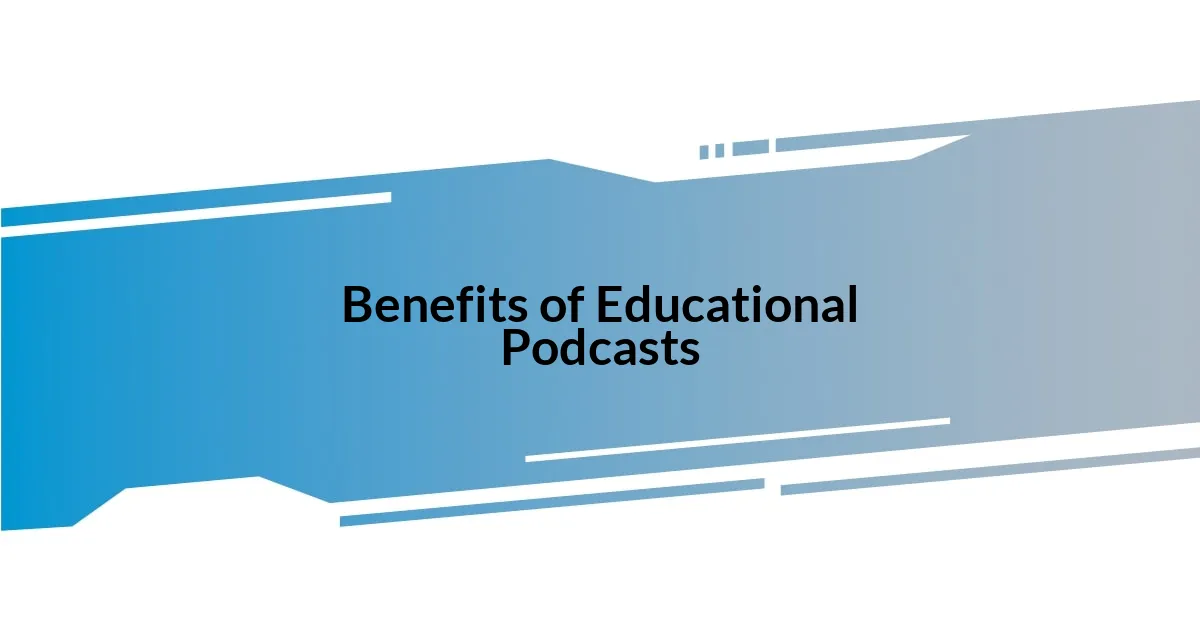
Benefits of Educational Podcasts
One significant benefit of educational podcasts is their ability to foster a love for learning in kids. I remember one rainy afternoon when my daughter discovered a podcast about dinosaurs. Her eyes lit up with enthusiasm as she absorbed fascinating facts, and it sparked a series of conversations between us. Isn’t it magical when kids find joy in learning?
Podcasts also cultivate critical thinking skills. I often hear my son ask questions like, “Why do you think that happened?” or “Can that be true?” after listening to a story about science or history. These discussions delve deeper than surface-level facts, encouraging them to analyze information and explore different perspectives. Doesn’t that make you wonder how much more engaged children are when actively processing what they hear?
Moreover, educational podcasts are incredibly convenient, fitting seamlessly into our busy lives. Whether we’re driving to soccer practice or winding down for bed, I can easily share knowledge-packed content that captures my kids’ imagination. It’s a wonderful way to turn mundane moments into opportunities for learning. Don’t you find it refreshing to make the most of the little chunks of time we have together?
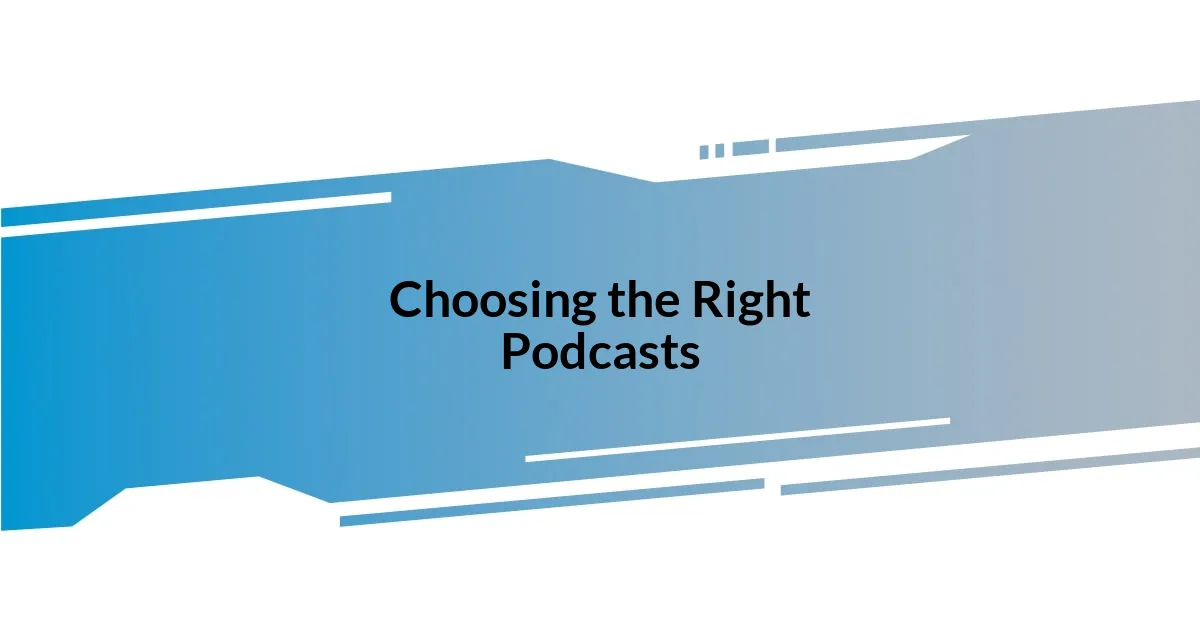
Choosing the Right Podcasts
Choosing the right podcasts is essential for fostering an enriching experience with my kids. I always consider their interests and age when selecting content. For example, my younger child enjoys storytelling podcasts that feature whimsical characters, while my older one leans toward more educational formats that challenge their understanding. This thoughtful approach ensures they remain engaged and eager to learn.
I also recommend checking the podcast’s reviews and ratings. One time, I excitedly introduced a popular science podcast, only to discover it was too advanced for my kids. Their initial excitement turned into confusion, which gave me pause about my choices. That’s when I learned that just because something is popular doesn’t mean it’s the right fit for my little learners.
Lastly, I often listen to an episode myself before sharing it with them. This practice has saved me from a few awkward moments and helped me curate podcasts that align with our family values. Sometimes, it even leads to delightful discoveries—like the time I found a fun geography podcast that turned our holiday road trip into an exciting learning adventure. Isn’t it amazing how a little pre-listening can enhance our shared experience?
| Factor | Description |
|---|---|
| Interests | Match podcasts to kids’ hobbies and passions |
| Age Appropriateness | Select content suitable for their developmental stage |
| Reviews | Check ratings to ensure quality |
| Personal Preview | Listen before sharing to ensure relevance |
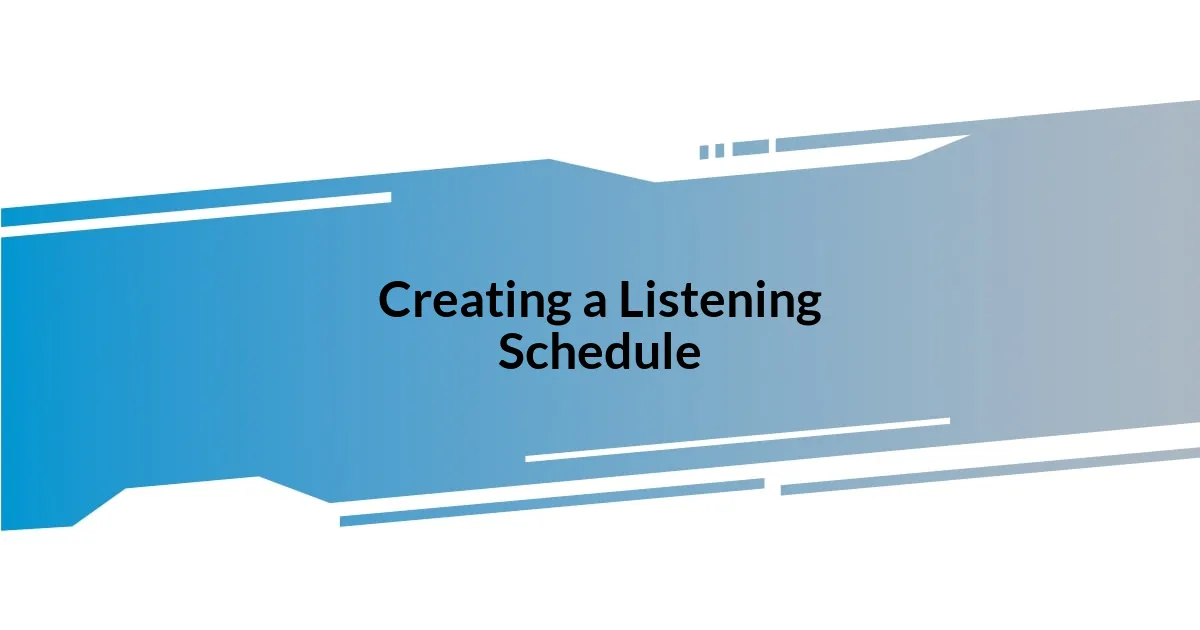
Creating a Listening Schedule
Creating a listening schedule has transformed our family time with educational podcasts. I’ve found that setting specific days for podcast listening keeps the excitement alive and helps manage expectations. For instance, every Wednesday evening is “Podcast Night” at our house, where we gather in the cozy living room, blanket fort-style, and dive into a new episode together. It’s a bonding experience that my kids look forward to just as much as their favorite TV show.
To effectively create our schedule, I keep the following in mind:
- Daily Routine: Identify times during the week when listening fits naturally, like during breakfast or afternoon downtime.
- Variety of Topics: Mix themes so everyone stays interested—science one day, history the next.
- Length of Episodes: Choose podcasts that match attention spans; I aim for episodes between 15 to 30 minutes.
- Feedback Sessions: After episodes, we have a quick chat, which allows my kids to express their thoughts and feelings—this openness really deepens their engagement and helps me adjust our future picks.
- Flexibility: Be ready to switch things up! If an episode doesn’t resonate, I note it for future reference and tweak the schedule accordingly.
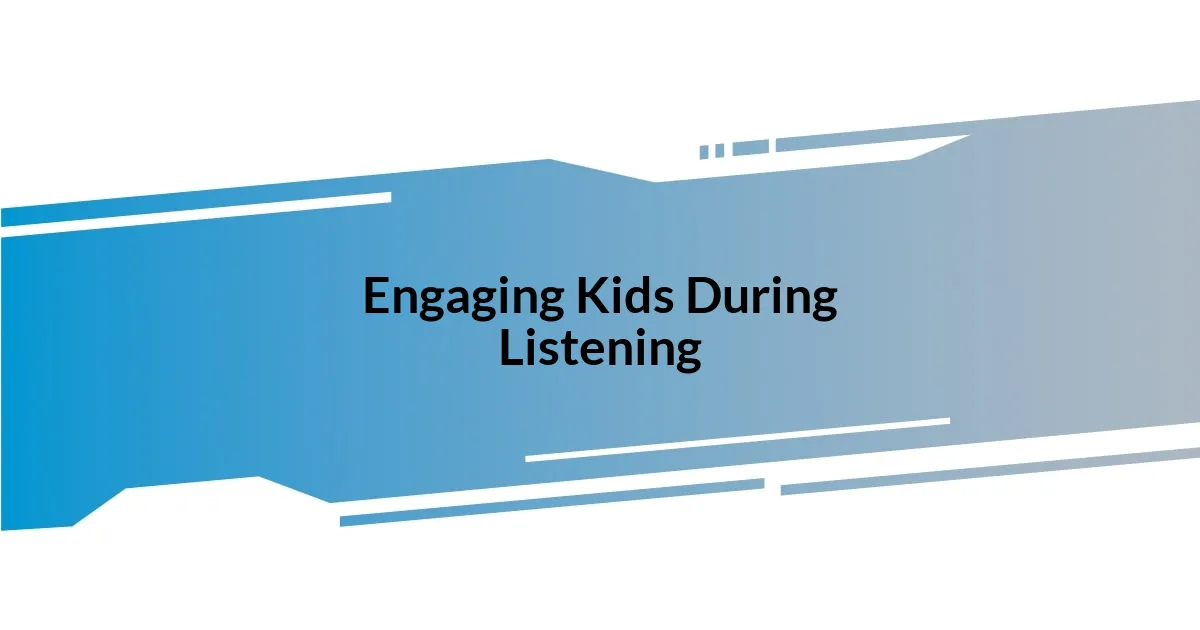
Engaging Kids During Listening
Keeping kids engaged during the podcast is about creating interactive moments. One method that has worked wonders for us is asking questions throughout the episode. For instance, when we listened to a podcast on space, I would prompt, “What do you think is the coolest planet?” Instantly, I could see their minds whirring, and they’d enthusiastically share their thoughts. It turns listening into a conversation, rather than just passive absorption.
Another engaging tactic I’ve tried is incorporating activities that align with the podcast content. After listening to a podcast about ancient Egypt, we had a mini art session where my kids created their own hieroglyphics. It was fascinating to watch them draw and discuss what they’d learned, forming connections between the audio and their creative expression. Isn’t it great how hands-on activities can solidify learning in such a fun way?
Lastly, I find that inviting my kids to share their own stories related to the topics really enhances engagement. The other day, after an episode about wildlife conservation, my daughter began recounting her experience at a local animal shelter. Listening to her passionately describe her day made the topic feel real and relevant. Isn’t it amazing how our shared experiences can lead to deeper discussions? Creating a space for these little conversations during or right after listening keeps the learning alive long after the podcast ends.
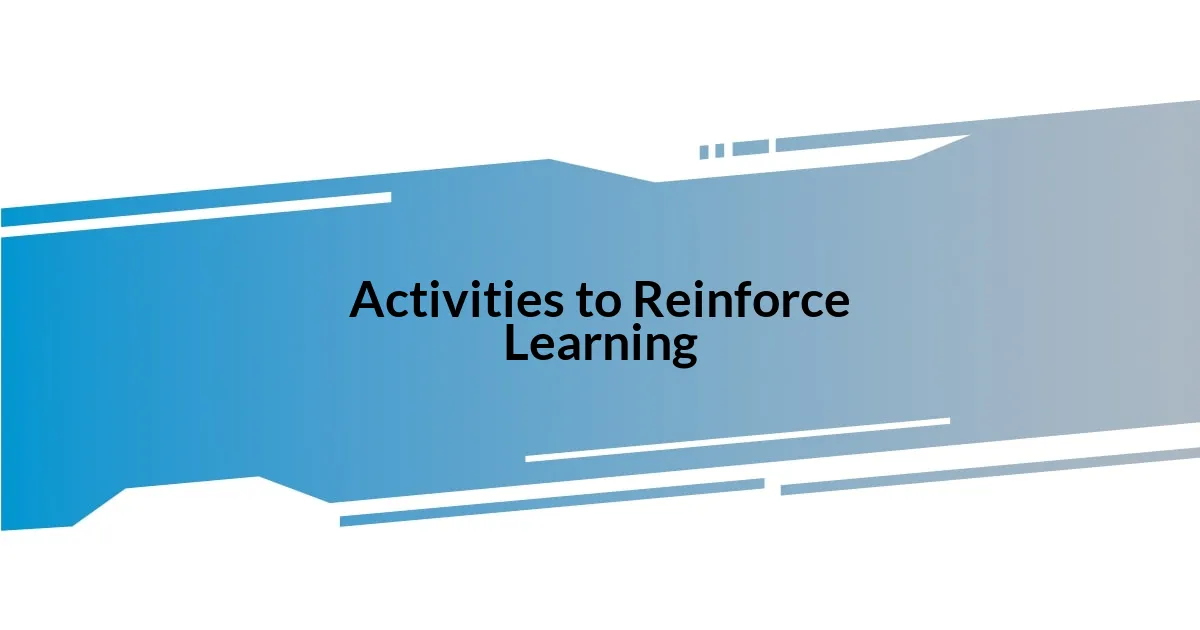
Activities to Reinforce Learning
One of my favorite activities to reinforce learning is turning podcast topics into hands-on experiments. For example, after listening to an episode about the water cycle, we took it to the next level by creating our own mini weather station. While we mixed water with different temperatures, we talked about evaporation and condensation—watching the steam rise was like magic for my kids! Have you ever seen their eyes light up when they truly understand something? It’s such a rewarding moment.
In addition, I love incorporating themed family game nights based on the podcast content. Recently, after an episode focused on world cultures, we organized a trivia night. It was filled with laughter and a little bit of friendly competition, which sparked discussions about the different customs we’d learned about. It’s wonderful how a fun game can reinforce knowledge and create lasting memories at the same time. Doesn’t it make you think about the different ways we can learn together as a family?
Another activity that resonates well with my kids is storytelling based on the podcast themes. After listening to a story about historical figures, we crafted our own tales featuring those characters in different adventures. My son took it a step further, adding his own twist by mixing in modern elements—like a knight battling a robot! Seeing their creativity flow in response to what they’ve heard makes the connection more profound. Don’t you think storytelling is a beautiful way to process and internalize new information?
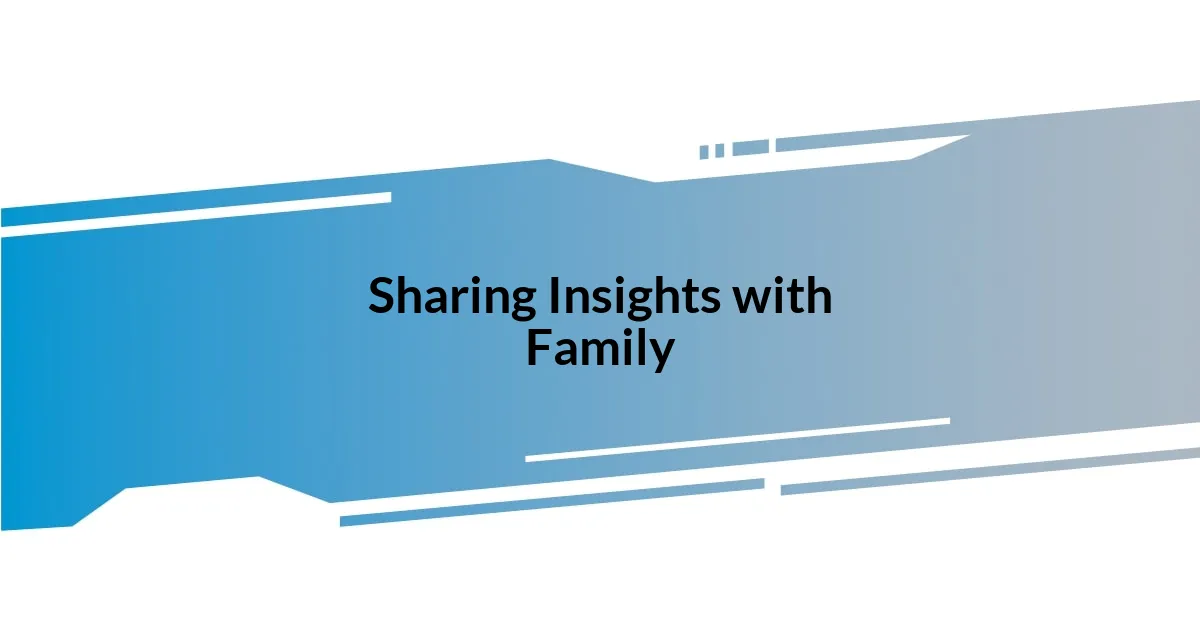
Sharing Insights with Family
Sharing insights with family after listening to educational podcasts has become a cherished ritual in our home. For example, not long ago, my kids finished an episode that explored diversity in nature. They were buzzing with excitement and wanted to show me a picture of a rare plant they learned about. It warmed my heart to see them so eager to share their newfound knowledge, demonstrating how these discussions forge connections and create lasting memories.
I’ve noticed that these moments often lead to deeper conversations that extend beyond the podcast episode. A week after listening to a podcast about the solar system, my son asked why some planets have rings. Delving into that question, we explored a bunch of related topics together, sparking even more curiosity. Isn’t it incredible how one simple question can open the door to a universe of learning? I truly value these discussions as they not only allow us to bond but also foster a culture of inquiry at home.
Sometimes, we turn our podcast insights into family debates or friendly challenges. Recently, after an episode on renewable energy, we held a family discussion on what we could do to be more eco-friendly. Each of us brought our ideas to the table; my daughter even suggested having a family garden. Now, we’re planting seeds together, literally and figuratively! What better way to share insights than to put them into action? These conversations not only empower my kids but also encourage us to articulate our thoughts and values openly—a beautiful way to learn together.
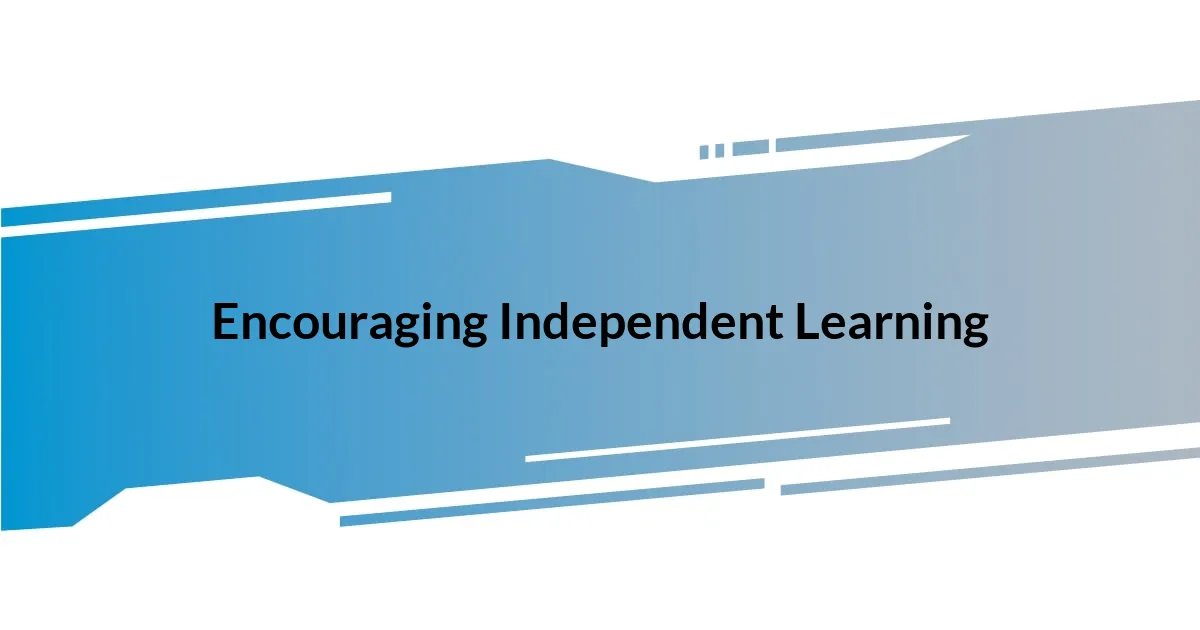
Encouraging Independent Learning
Encouraging my kids to learn independently through podcasts has been an eye-opening experience for me. After a particularly fascinating episode about space travel, I saw my daughter immersed in a project to create her own rocket model. I remember how her eyes sparkled with determination as she drew blueprints and gathered materials, all while asking questions that showed she was thinking critically about what she’d heard. Isn’t it amazing how the right spark can ignite such passion in our children?
I also try to give my kids the freedom to choose which podcasts to listen to, promoting a sense of ownership over their learning journey. One day, my son picked an episode about ancient civilizations. Watching him take the initiative and explore the topic on his own terms was incredibly gratifying—he even started sketching out ideas for a DIY Egyptian pyramid! How empowering must it feel for them to know they have the reins in this learning process, right?
Reflecting on their independent pursuits, I often find myself pleasantly surprised by the connections they make. Last week, after diving into a podcast about marine biology, my kids independently came up with a plan to raise awareness about ocean conservation in our community. They put together a presentation for their friends, complete with colorful visuals and fun facts! I couldn’t help but feel a swell of pride at how they took what they learned and turned it into action. Don’t you think encouraging independence like this fosters a proactive mindset that will serve them well in life?